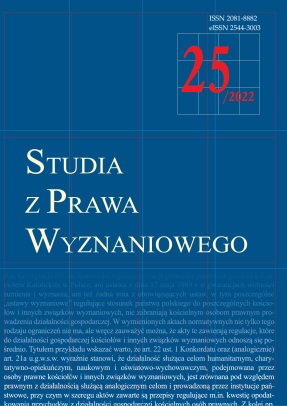Dudová and Duda before the Czech Constitutional Court: The question of autonomy of religious organizations
Dudová and Duda before the Czech Constitutional Court: The question of autonomy of religious organizations
Author(s): Marián Bartoloměj ČačíkSubject(s): Law, Constitution, Jurisprudence, Constitutional Law, Human Rights and Humanitarian Law, Comparative Law
Published by: Katolicki Uniwersytet Lubelski Jana Pawła II - Wydział Prawa, Prawa Kanonicznego i Administracji
Keywords: church autonomy; Constitutional Court of the Czech Republic; Supreme Court of the Czech Republic; clergy
Summary/Abstract: In the Czech Republic, the autonomy of churches is constitutionally guaranteed in a rather broad manner. The constitutional and legal basis for Church autonomy lies in the Charter of Fundamental Rights and Freedoms, which is part of the Czech constitutional order. It represents both an objective institutional guarantee (religious neutrality of the state) and the subjective right of religious communities to independence from the state and self-governance of their own affairs (the right to self-determination). Compared to other domains of the said autonomy, the staffing of churches is a relatively frequent subject of theoretical reflection and decision-making on the part of Czech courts. The Constitutional Court of the Czech Republic had to express its opinion on some problematic cases, in particular, the limits of Church autonomy.The case of Duda and Dudová is an example of a conflict between civil rights and the autonomy of churches in the modern Czech history. It started with Duda and Dudová’s dismissal from the pastoral ministry in the Czechoslovak Hussite Church in 1993, and the last (so far) decision related to this case was issued by the Constitutional Court in 2021. This article discusses the long and tortuous journey through the Czech judiciary system, which Duda, Dudová, and the Czechoslovak Hussite Church had to go through in order to clarify consequences of church autonomy. A particular deviation in the Supreme Court’s decision-making played an interesting role in this process. However, it was the Constitutional Court, which acted as the guardian of constitutional values (including the internal autonomy of churches), that placed this anomaly in the decision-making of the Supreme Court and, subsequently, general courts back within constitutional limits.
Journal: Studia z Prawa Wyznaniowego
- Issue Year: 2022
- Issue No: 25
- Page Range: 67-90
- Page Count: 24
- Language: English

